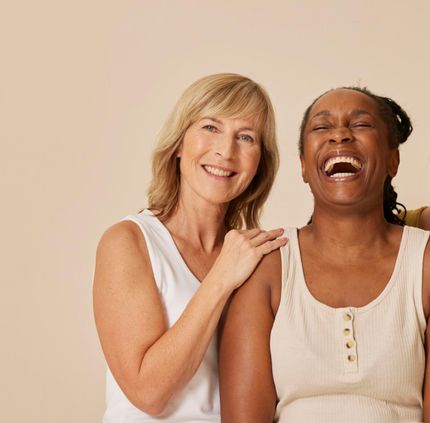Acne and menopause
Many women are prepared for symptoms like hot flashes and mood swings when perimenopause starts. What you may not have been expecting, however, are pimples, acne and facial redness. Although less common, menopause can increase the risk of skin problems due to fluctuating hormones. The good news is that there are many things you can do to improve your skin.

My daughter is going through puberty, I’m menopausal and we both have acne. I never thought I’d be struggling with acne at my age. - Rita (age 51)

Studies show that many women experience skin problems in the form of acne and pimples during menopause. A 2022 study states that as many as 64 percent of women attending menopause clinics report skin problems.
Skin problems are most common in perimenopause, the first stage of menopause, when hormone fluctuations are most extreme. In general, skin problems decrease over time as hormone levels plateau at a stable low state in postmenopause (12 months after a woman’s final period). However, how long these problems will last and how intense the symptoms are, varies from one woman to the next.
What is happening in your body?
In the years leading up to menopause, oestrogen and progesterone levels begin to fluctuate and fall. This can lead to hormonal imbalances, causing your testosterone levels to soar. The male sex hormone testosterone stimulates sebum production in the skin. If testosterone levels are high relative to progesterone and oestrogen, this can lead to clogged pores, impurities and acne.
Oestrogen also promotes the production of collagen, which keeps the skin firm and supple. When oestrogen begins to fluctuate and fall around menopause, collagen production decreases along with it. This can result in sensitive skin, skin irritation and red patches. Reduction in collagen can also contribute to dry skin and skin ageing.
Other causes
It is important to understand that skin problems, such as acne and pimples, typically result from multiple factors, or from an interaction between factors. Hormonal changes play a big role, but there are also other factors that can trigger acne.
- Smoking can reduce blood flow to the skin, slow down skin healing and increase sebum production.
- Unprotected sun exposure dries out the skin, increases sebum production and damages the skin’s barrier.
- Wrong skin care habits and cosmetics can irritate the skin, disrupt the production of sebum and cause clogged pores.
- Lack of sleep and stress can disrupt hormonal balance, affect the skin's repair processes and exacerbate inflammation.
Nutrition, medication and other health conditions also play a pivotal role in healthy skin. That's why it is important to approach skin health from a broad perspective that considers all factors that can cause blemishes, acne and other skin problems.
What can you do?
As we age, our skin needs more care and attention to retain its health. Adjusting your diet and lifestyle can keep your skin healthy and reduce skin problems, including acne.
- Eat more vegetables and fruit. A diet rich in vitamins (especially A and C), minerals and antioxidants can support skin health. Vitamin A regulates sebum production and stimulates cell renewal. Vitamin C supports collagen production. Vitamin A is found in carrots and sweet potatoes. Food sources high in Vitamin C include citrus fruits, kiwis and peppers.
- Avoid sugars and fast carbohydrates. A high carb and sugar intake raises your blood sugar levels, which can trigger inflammation and skin problems.
- Eat sufficient healthy fats. Healthy fats, such as omega-3 (from nuts, seeds and oily fish), strengthen the skin’s barrier function and help retain moisture. Evening Primrose Oil is a supplement with gamma linolenic acid (GLA), an essential fatty acid with anti-inflammatory and skin care properties.
- Drink plenty of water. By this, we mean at least 1.5 litres a day. Dehydrated skin causes excessive sebum production.
- Choose the right skin care products. Avoid products with alcohol or strong fragrances. They might dry out your skin and irritate it further. Instead, use skin care products with proven active ingredients like retinol (Vitamin A), collagen, squalane, hyaluronic acid, niacinamide, Vitamin C and/or Vitamin E.
Your path to a smooth menopause starts here
Get the tools you need to navigate menopause with more ease and to educate yourself about your body. With tips and insights from experts, and relatable stories of women just like you. Press play, not pause.
What treatments can help?
A healthy diet can contribute to healthy skin and reduce, or prevent, blemishes and other skin issues. Are you experiencing other symptoms of menopause besides skin problems? Then hormone therapy might be an option for you.
Can hormone therapy help?
Hormone replacement therapy (HRT) can make a huge difference to a woman's quality of life and well-being during menopause. Lots of women say that HRT has helped make them feel better, both physically and mentally. HRT replaces lost hormones to counteract (severe) symptoms of menopause, such as hot flashes, sleep problems and vaginal dryness.
Are you suffering from severe menopausal problems and feel that there are no treatments? Well, you could be wrong. HRT might be right for you.
Sources
- Kamp, M. E., Ashraf, M., Musbahi, E., & DeGiovanni, C. (2022). Menopause, skin and common dermatoses. Part 2: Skin disorders. Clinical and Experimental Dermatology, 47(12), 2117–2122. https://academic.oup.com/ced/article/47/12/2117/6966236
- Flament, F., Bazin, R., Laquieze, S., Rubert, V., Simonpietri, E., & Piot, B. (2013). Effect of the sun on visible clinical signs of aging in Caucasian skin. PMID: 24101874.
- Goodman, G. D., Kaufman, J., Day, D., Weiss, R., Kawata, A. K., Garcia, J. K., Santangelo, S., & Gallagher, C. J. (2019). Impact of smoking and alcohol use on facial aging in women: Results of a large multinational, multiracial, cross-sectional survey. PMID: 31531169.
- Harvard T.H. Chan School of Public Health. (2021). Collagen. https://hsph.harvard.edu/department/nutrition/
- Khunger, N., & Mehrotra, K. (2019). Menopausal acne – Challenges and solutions. *International Journal of Women’s Health, 11*, 555–567. https://www.dovepress.com/menopausal-acne-challenges-and-solutions-peer-reviewed-fulltext-article-IJWH
- Raine-Fenning, N. J., Brincat, M. P., & Muscat-Baron, Y. (2003). Skin aging and menopause. *American Journal of Clinical Dermatology, 4*, 371–378. https://link.springer.com/article/10.1007/s13224-019-01213-7
- Just, M., Ribera, M., Monsó, E., Lorenzo, J. C., & Ferrándiz, C. (2007). Effect of smoking on skin elastic fibres: Morphometric and immunohistochemical analysis. PMID: 17199572.
Tips and advice


FAQ
Is hormone therapy an option for blemished skin?
Hormone therapy (with bioidentical hormones) may be an option if you experience other menopause symptoms besides blemishes that cannot be remedied by lifestyle and dietary changes. Hormone therapy is not recommended if only skin blemishes need to be treated because of possible side effects.












